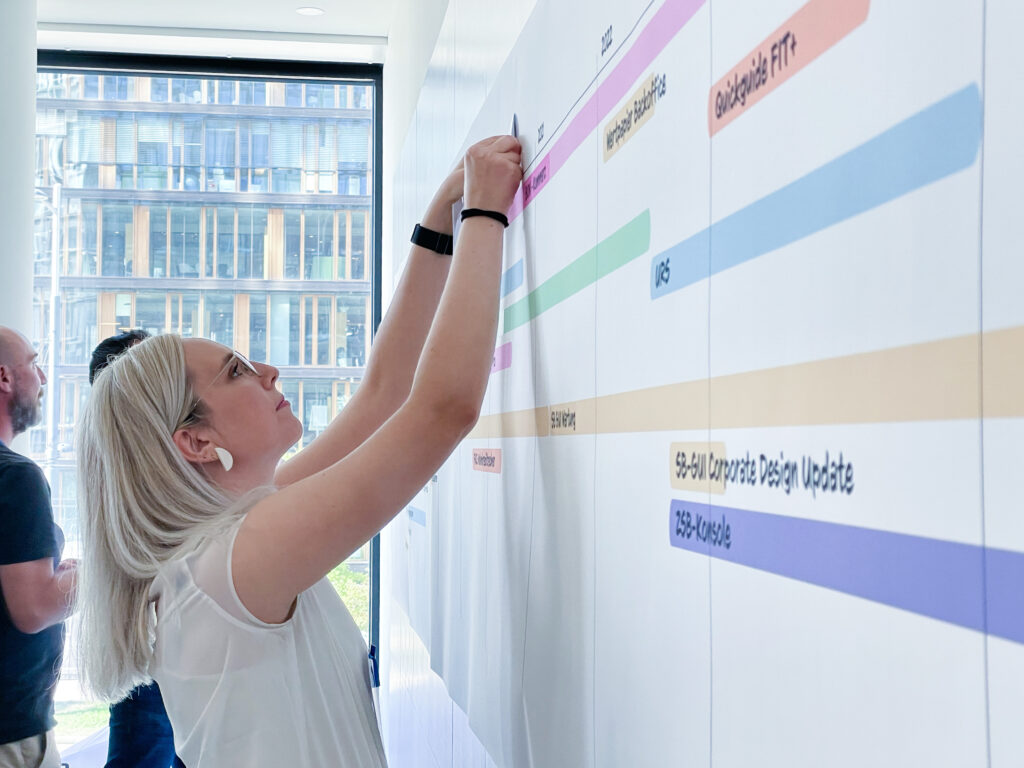Generation Z is revolutionizing the world of work. In order to retain this generation in the long term, companies need to integrate flexible working models, meaningful tasks and modern technologies into their strategy.
Why do companies need to focus on retaining Generation Z employees?
Generation Z (Gen Z), born between the mid-1990s and early 2010s, is a growing and influential group in today’s working world. With a strong affinity for technology, a strong need for flexibility and a deep-rooted expectation of meaningfulness in their careers, members of this generation differ significantly from their predecessors. As an employer branding agency, we know that at a time when skills shortages and high turnover rates pose challenges for companies, employee retention – defined as a strategic approach to securing the loyalty and commitment of employees and extending their time with the company – is becoming a key success factor. Traditional retention strategies that worked for older generations, such as a high salary or job security, often fall short when it comes to Generation Z. This cohort expects more than just monetary incentives; they are looking for a meaningful and fulfilling work environment. Studies show that companies that specifically address the needs and values of this generation not only increase their retention rates, but also build a more dynamic and innovative workforce.
5 tips for better employee retention
Including Generation Z in the corporate strategy requires an understanding of their specific needs and behaviors. It is essential to recognize the dynamics of this generation and implement measures aimed at their long-term satisfaction and loyalty. In recruiting and employer branding, companies must be aware of the future generations and their demands and respond to them. As an employer branding agency, we present 5 tips that offer insights into effective employee retention measures for Generation Z:
Offering flexibility and work-life balance
Active involvement in CSR topics
Regular feedback recognition
Provide opportunities for professional and personal development
Using technologies and digital tools for communication
1. Offer flexibility and work-life balance
Today’s working world is increasingly characterized by flexibilization and the dissolution of traditional working patterns. For Generation Z, the integration of work and private life is a central concern. While previous generations often drew clear boundaries between work and leisure, Generation Z strives for a harmonious fusion of both areas, which can be supported by flexible working models. This requires companies to implement flexible working arrangements (FWA), which not only include home office options, but also flexible working hours and the option of job sharing. Studies show that a flexible working environment not only increases satisfaction, but also boosts productivity and has a positive impact on employee well-being. Companies that respond to the individual needs of their employees and promote agile working models can thus achieve higher employee retention. The challenge is to find a balance between flexibility and the operational requirements of the company without jeopardizing the corporate culture and team cohesion.
2. Active involvement in CSR topics
For Generation Z, the meaningfulness of their work plays a central role. They are not just looking for a job, but for an activity that gives them the feeling of making a positive contribution – be it to the company, society or the environment. This generation tends to identify strongly with the values and goals of their employer. Companies that are able to clearly communicate their mission and vision and translate them into concrete, meaningful projects have a competitive advantage when it comes to employee retention. One way of conveying this sense of purpose is to actively involve employees in corporate social responsibility (CSR) initiatives or to assign them the management of projects that have a direct social or environmental impact. This not only strengthens identification with the company, but also employee engagement. The challenge lies in finding a balance between operational goals and the provision of projects that pursue a higher purpose without neglecting business objectives.
Gen Z
Recruiting
We help you take your recruiting and employer branding to the next level and not only reach Generation Z, but also attract them to your company. Ready for the next step? Contact us and find out more about our services.
3. Give regular feedback and recognition
Generation Z is characterized by the age of instant feedback and constant networking. Real-time feedback is almost a matter of course for this generation, as they have grown up in a digital environment in which constant communication and feedback are the norm. Companies that rely on traditional annual appraisals run the risk of losing this generation. Instead, continuous feedback loops are required, which can be supported by modern performance management systems. Furthermore, as an employer branding agency, we find that recognizing achievements is an important motivator for Generation Z. This can be achieved through various measures, such as Employee Recognition Programs, which can range from small tokens of appreciation to formal awards. A culture of recognition not only contributes to motivation, but also promotes a positive working atmosphere and strengthens employees’ emotional ties to the company. It is important that feedback is constructive, timely and specific to enable genuine improvement and appreciation.
4. Provide opportunities for professional and personal development
A key characteristic of Generation Z is their strong desire for personal and professional development. They see further training not only as a way to improve their career opportunities, but also as a means of self-realization. Companies that offer targeted learning and development (LD) programs tailored to the needs and interests of this generation can significantly increase employee retention. Digital learning platforms that enable self-paced learning and programs that promote soft skills and leadership competencies are particularly in demand here. The opportunity for continuous professional development not only helps to increase employee satisfaction, but also increases the employability of employees within the company. It is crucial that companies promote a culture of lifelong learning and actively support access to training resources.
5. Use technology and digital tools for communication
Generation Z is the first true digital native generation to have grown up with smartphones and the internet. For them, technology is not just a tool, but an integral part of life. Companies that integrate modern technologies and digital tools into their communication strategies appeal directly to this generation. Collaborative platforms such as Slack, Microsoft Teams or Asana enable fast and efficient communication while promoting the exchange of ideas and information in real time. In addition, companies should use digital tools not only for work communication, but also to promote social cohesion. Virtual team-building activities, online communities and digital feedback tools help to create a sense of belonging, which is crucial for the retention of Generation Z. However, it is important to maintain a balance between digital communication and face-to-face interaction to avoid overload from constant digital presence.
Conclusion
Employee retention of Generation Z requires a deep understanding of their values and expectations. Flexibility, meaningful work, continuous feedback, development opportunities and the use of modern technologies are the keys to a successful retention strategy. Companies that integrate these aspects into their corporate culture will not only benefit from a lower turnover rate, but also from a committed, innovative and future-oriented workforce that will ensure the long-term success of the company. The challenges and opportunities that this generation brings require a proactive and dynamic management that is willing to rethink traditional structures and ways of thinking.
Conclusion
Retaining Generation Z employees requires a deep understanding of their values and expectations, and flexibility, meaningful work, continuous feedback, development opportunities and the use of modern technology are the keys to a successful retention strategy. Companies that integrate these aspects into their corporate culture not only benefit from a lower turnover rate, but also from a committed, innovative and future-oriented workforce that ensures the long-term success of the company. The challenges and opportunities presented by this generation requirex a proactive and dynamic management that is willing to rethink traditional structures and ways of thinking.
From the latest industry trends and the latest insights into AI and UX/UI design to exciting use cases. Sign up for our monthly newsletter and stay up to date!
Stay
tuned
More articles




